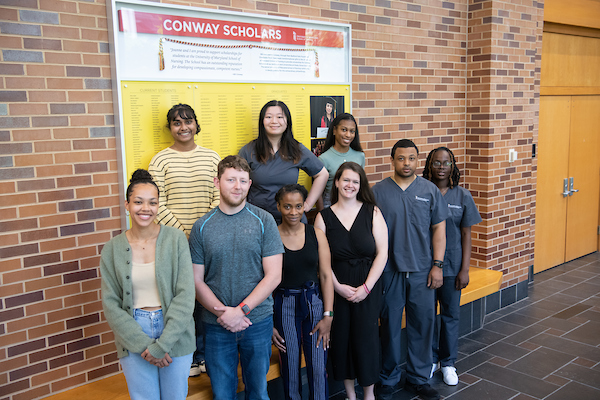University of Maryland School of Nursing Receives $7 Million Gift for Scholarships
May 03, 2023 Mary Therese Phelan
The additional Conway Innovation Challenge grant funding will create a faculty residency program to support new nurse faculty and increase retention and the caliber of educators.
A gift of $7 million to the University of Maryland School of Nursing (UMSON) from the Bedford Falls Foundation-DAF, a donor-advised fund established by Bill and Joanne Conway, will create 218 additional Conway Scholarships over the next four years. In addition, UMSON has received a Conway Innovation Challenge grant of $145,000, which will fund a pilot of UMSON’s Nursing Professional Residency for Outstanding Faculty (N-PROF) from the Conways’ Bedford Falls Foundation Charitable Trust.
The $7 million gift will fund 116 Bachelor of Science in Nursing scholarships, 42 Master of Science in Nursing Entry-into-Nursing program scholarships, and 60 scholarships for the Teaching in Nursing and Health Professions Certificate. These 218 scholarships, which will be awarded from spring 2024 through fall 2027, will cover 50 percent to 100 percent of students’ tuition, fees, and books. The latest gift, the fifth from the Conways since 2015, brings the total amount the Conways have contributed to $36.24 million. To date, UMSON has awarded Conway Scholarships to 468 students, 354 of whom have graduated. By 2027, more than 1,000 students are expected to have been designated Conway Scholars.
The gift also supports the creation of a full-time faculty position dedicated to preparing entry-into-nursing students for the Next Gen NCLEX, the newest version of the National Council Licensure Examination, which is designed to assess clinical judgment in nursing licensure candidates, measuring future nurses’ ability to think critically about how to care for patients.
The gift also supports expanded promotion of UMSON’s Teaching in Nursing and Health Professions Certificate, a program critical to preparing and increasing the number of nurse faculty statewide. The nation is in the midst of a staggering shortage of nurse educators, with an estimated 9 percent vacancy rate and a wave of faculty retirements projected by 2025, according to the American Association of Colleges of Nursing in its Survey on Vacant Faculty Positions for Academic Year 2022-2023. Increasing the number of nurse faculty is intrinsically tied to expanding the nursing workforce. To graduate more students to bolster the number of nurses who are prepared to provide excellent care to patients, the state needs more nurse faculty to teach them.